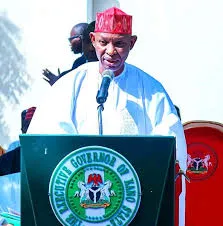
Kano State Government Rejects Tax Reform Bills: Reasons and Impact Explained
The Kano State Government has expressed strong opposition to the proposed tax reform bills currently before the National Assembly.
Governor Abba Kabir Yusuf, represented by Deputy Governor Aminu Abdussalam Gwarzo, articulated this stance during the 2025 New Year celebration at Filin Mahaha, Kofar Naisa open theatre.
Governor Yusuf criticized the proposed tax reforms as “ill-timed, lopsided, and inimical to the unity of the country,” emphasizing that they could exacerbate the economic hardships faced by Nigerians, particularly in the northern region.
He stated, “This tax reform bill is not the solution to our economic challenges. Kano State stands firmly against any policy that negatively affects the welfare of our people.”
The governor highlighted the resilience of Kano residents amid economic challenges and urged the federal government to focus on addressing extreme poverty and hunger, especially in the northern part of the country.
He also underscored his administration’s achievements in healthcare, education, road construction, and foreign scholarship initiatives.
This development follows similar concerns from other northern leaders regarding the proposed tax reforms.
For instance, former Kano State Governor Ibrahim Shekarau noted that the main issue northern leaders have with the tax reform bills is the lack of inclusiveness, suggesting that the general public was not adequately consulted.
The federal government’s tax reform initiative aims to address economic challenges, but it has faced criticism from various quarters. The Kano State Government’s rejection adds to the growing debate over the potential impact of these reforms on different regions and demographics within Nigeria.
Leave a Reply